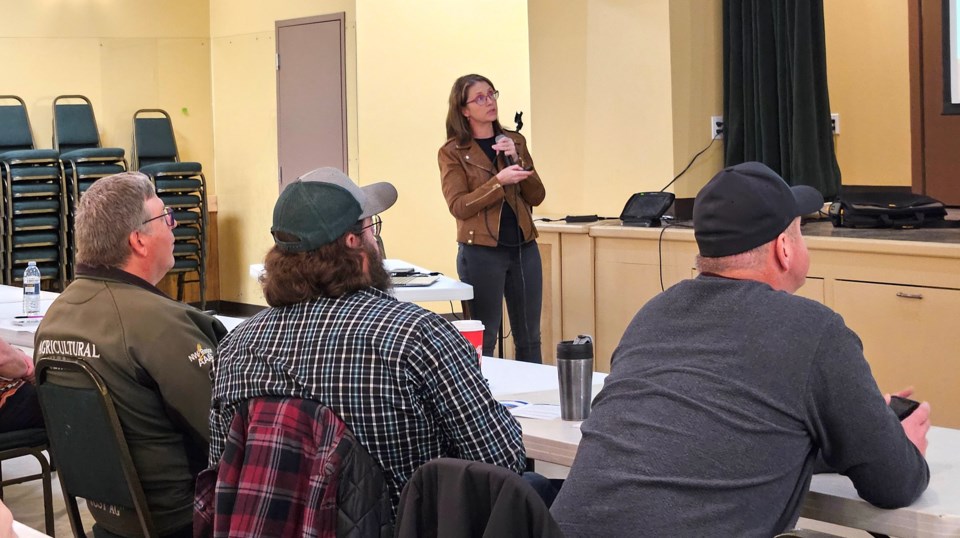WESTLOCK — Crop and livestock producers from across the region are better prepared to deal with drought this summer, thanks to the expertise and information shared at a “Working with Drought” workshop April 16 at Hazel Bluff Hall.
The day-long event was presented in collaboration between Westlock County, Thorhild County, Athabasca County and County of Barrhead and included several guest speakers, with representatives from the Athabasca Watershed Council, ALUS, Cows and Fish, Union Forage and Neerlandia farmer and Ag expert Dr. Sheri Strydhorst, with Sheri’s Ag Consulting Inc.
“It’s making sure people are aware and they can make the best decisions possible,” said Strydhorst, about her message to farmers. “We’re never going to know what the rainfall is going forward but if we understand and I think we can maybe temper some of our anxiety if we know that drought at the beginning of the season is less damaging for yield later in the growing season,” she said. “So there’s still reason for optimism.”
Drought that occurs in May and June can still yield about 85 per cent of a crop, Strydhorst noted however, drought later in the season can have more devastating impacts.
“But if we get drought later in the growing season, July or August, we’re down 44 (to) 47 per cent and that’s heartbreaking but we don’t know what there is to come,” explained Strydhorst. “So in terms of managing it, we should plant early, we should plant at typical depth. Don’t wait for rain to plant because you might get to the May long weekend when it starts raining and it doesn’t stop and then you can’t get through the fields.”
In addition to drought, Strydhorst discussed other areas with farmers, including nutrient management, fertilizer, plant physiology and disease control.
“Drought manages (disease) for us … we’re not going to be loaded with disease typically under drought conditions,” she said.
About 50 farmers, including crop and livestock producers from across the region, attended the workshop, and while some said it was informative and provided some needed resources, others shared concerns over the current situation and anticipated drought this summer.
Pete Burden, an Athabasca farmer who runs a cow and calf operation, said there was lots to learn at the event but also shared his concerns over the current conditions in much of the northern part of the province.
“There’s quite a bit of information to be had here,” said Burden. “We’re basically just trying to figure out a way to mitigate our water use because we’re a lot drier than even Westlock — we’ve had no snow all winter, so it’s pretty scary right now back home.”
He pointed out how the drought is expected to impact his farm in the coming weeks.
“We’re probably going to have to haul water … so that’s definitely going to increase our costs plus the time commitment to it,” said Burden, noting they may try more cover crops to deal with drought this season. “ … but basically, we’re just looking for water sources of some kind, trying to manage ahead,” he added.
Barrhead grain farmer Uwe Quedenbaum has been farming here since 1995 and said they have been through drought before, so they know what to expect, but said it was an important opportunity for farmers to learn about what to do in such challenging conditions.
“The 2001 (drought) was a nasty one, when we had crop yields that were half of what we were expecting. So we’ve been through this before,” said Quedenbaum, noting he and his wife Nadine grow peas, barley, wheat, canola and fall rye.
“I think we’re going to be ok because we had that big rainfall in the fall so soil moisture I don’t think is that bad in our area,” he said. “In situations like this, you need to gather all the information to prepare.”
The biggest takeaway from her message, said Strydhorst, was that farmers “don’t panic” and “make smart decisions.”
“If economic risk is your big concern, back off on your fertilizer rates, do it smart and make informed decisions,” she said. “Another way for managing economic risk is if we have drought, we don’t have to spray fungicide, so there’s another way to save a few dollars. It’s not all lost and the more we know, the better we can cope with it all.”



